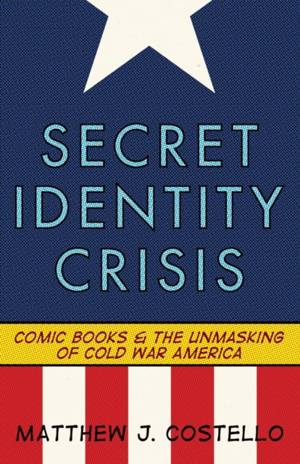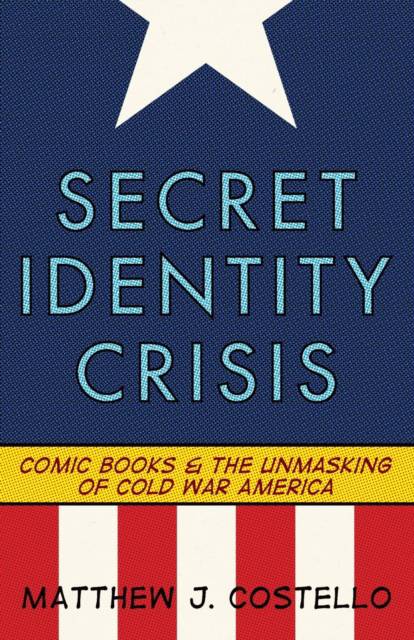
- Retrait gratuit dans votre magasin Club
- 7.000.000 titres dans notre catalogue
- Payer en toute sécurité
- Toujours un magasin près de chez vous
- Retrait gratuit dans votre magasin Club
- 7.000.0000 titres dans notre catalogue
- Payer en toute sécurité
- Toujours un magasin près de chez vous
Secret Identity Crisis
Comic Books and the Unmasking of Cold War America
Matthew J Costello
Livre broché | Anglais
67,95 €
+ 135 points
Description
What Cold War-era superheroes reveal about American society and foreign policy
Physicist Bruce Banner, caught in the nuclear explosion of his experimental gamma bomb, is transformed into the rampaging green monster, the Hulk. High school student Peter Parker, bitten by an irradiated spider, gains its powers and becomes Spiderman. Reed Richards and his friends are caught in a belt of cosmic radiation while orbiting the Earth in a spacecraft and are transformed into the Fantastic Four. While Stan Lee suggests he clung to the hackneyed idea of radioactivity in creating Marvel's stable of superheroes because of his limited imagination, radiation and the bomb are nonetheless the big bang that spawned the Marvel universe.
The Marvel superheroes that came to dominate the comic book industry for most of the last five decades were born under the mushroom cloud of potential nuclear war that was a cornerstone of the four-decade bipolar division of the world between the US and USSR. These stories were consciously set in this world and reflect the changing culture of cold War (and post-cold War) America. Like other forms of popular entertainment, comic books tend to be very receptive to cultural trends, reflect them, comment on them, and sometimes inaugurate them.
Secret Identity Crisis follows the trajectory of the breakdown of the cold War consensus after 1960 through the lens of superhero comic books. Those developed by Marvel, because of their conscious setting in the contemporary world, and because of attempts to maintain a continuous story line across and within books, constitute a system of signs that reflect, comment upon, and interact with the American political economy. This groundbreaking new study focuses on a handful of titles and signs that specifically involve political economic codes, including Captain America, the Invincible Iron Man, Nick Fury, Agent of SHIELD, the Incredible Hulk to reveal how the American self was transformed and/or reproduced during the late Cold War and after.
Physicist Bruce Banner, caught in the nuclear explosion of his experimental gamma bomb, is transformed into the rampaging green monster, the Hulk. High school student Peter Parker, bitten by an irradiated spider, gains its powers and becomes Spiderman. Reed Richards and his friends are caught in a belt of cosmic radiation while orbiting the Earth in a spacecraft and are transformed into the Fantastic Four. While Stan Lee suggests he clung to the hackneyed idea of radioactivity in creating Marvel's stable of superheroes because of his limited imagination, radiation and the bomb are nonetheless the big bang that spawned the Marvel universe.
The Marvel superheroes that came to dominate the comic book industry for most of the last five decades were born under the mushroom cloud of potential nuclear war that was a cornerstone of the four-decade bipolar division of the world between the US and USSR. These stories were consciously set in this world and reflect the changing culture of cold War (and post-cold War) America. Like other forms of popular entertainment, comic books tend to be very receptive to cultural trends, reflect them, comment on them, and sometimes inaugurate them.
Secret Identity Crisis follows the trajectory of the breakdown of the cold War consensus after 1960 through the lens of superhero comic books. Those developed by Marvel, because of their conscious setting in the contemporary world, and because of attempts to maintain a continuous story line across and within books, constitute a system of signs that reflect, comment upon, and interact with the American political economy. This groundbreaking new study focuses on a handful of titles and signs that specifically involve political economic codes, including Captain America, the Invincible Iron Man, Nick Fury, Agent of SHIELD, the Incredible Hulk to reveal how the American self was transformed and/or reproduced during the late Cold War and after.
Spécifications
Parties prenantes
- Auteur(s) :
- Editeur:
Contenu
- Nombre de pages :
- 288
- Langue:
- Anglais
Caractéristiques
- EAN:
- 9780826429988
- Date de parution :
- 01-03-09
- Format:
- Livre broché
- Format numérique:
- Trade paperback (VS)
- Dimensions :
- 137 mm x 211 mm
- Poids :
- 385 g

Les avis
Nous publions uniquement les avis qui respectent les conditions requises. Consultez nos conditions pour les avis.






